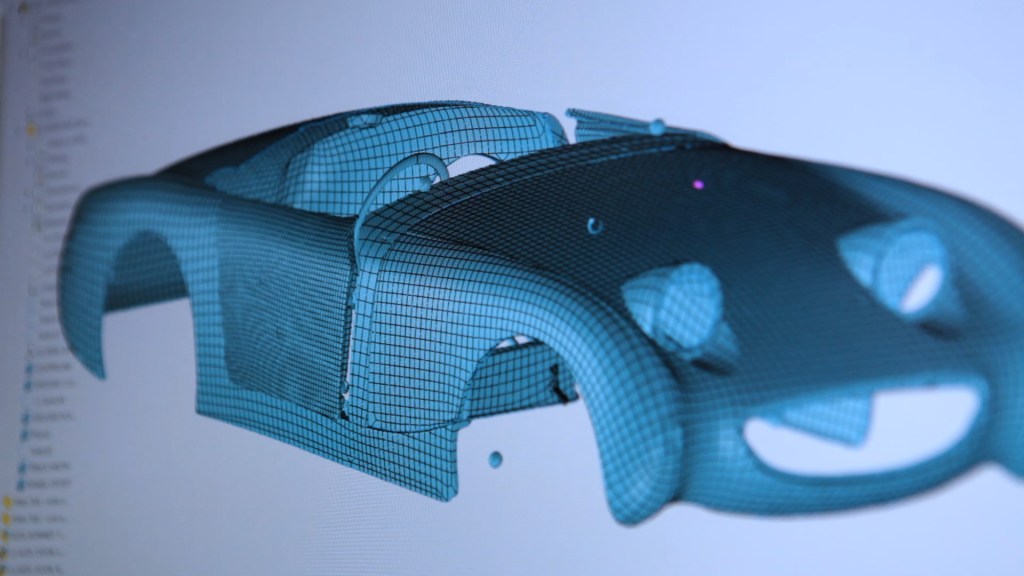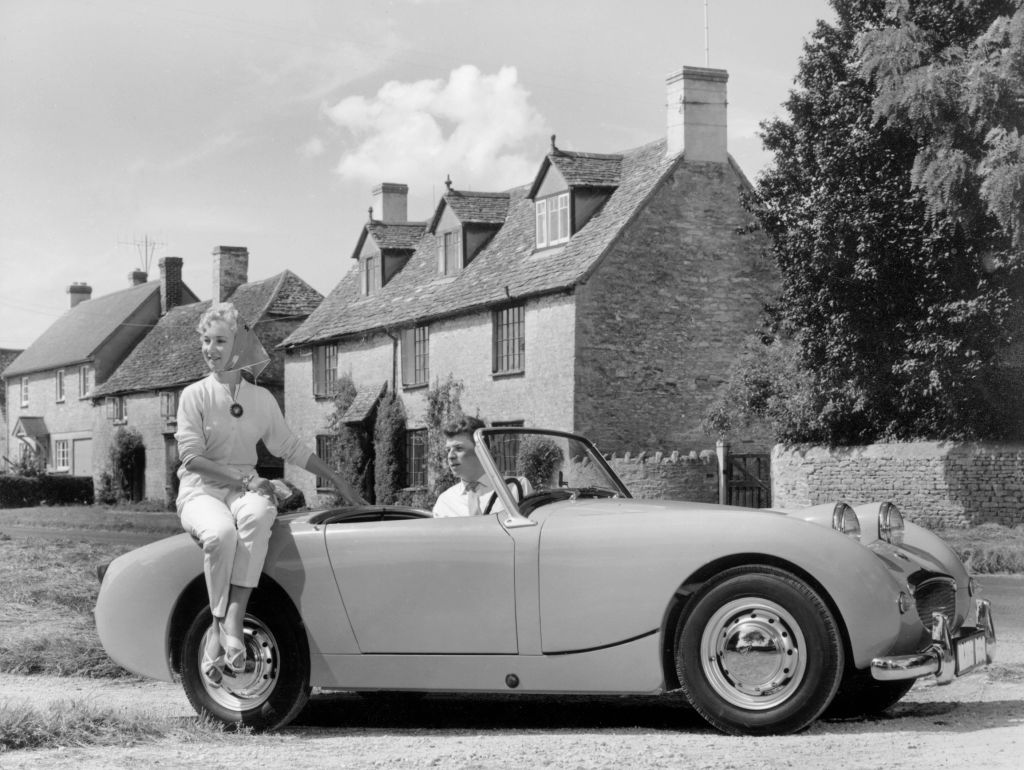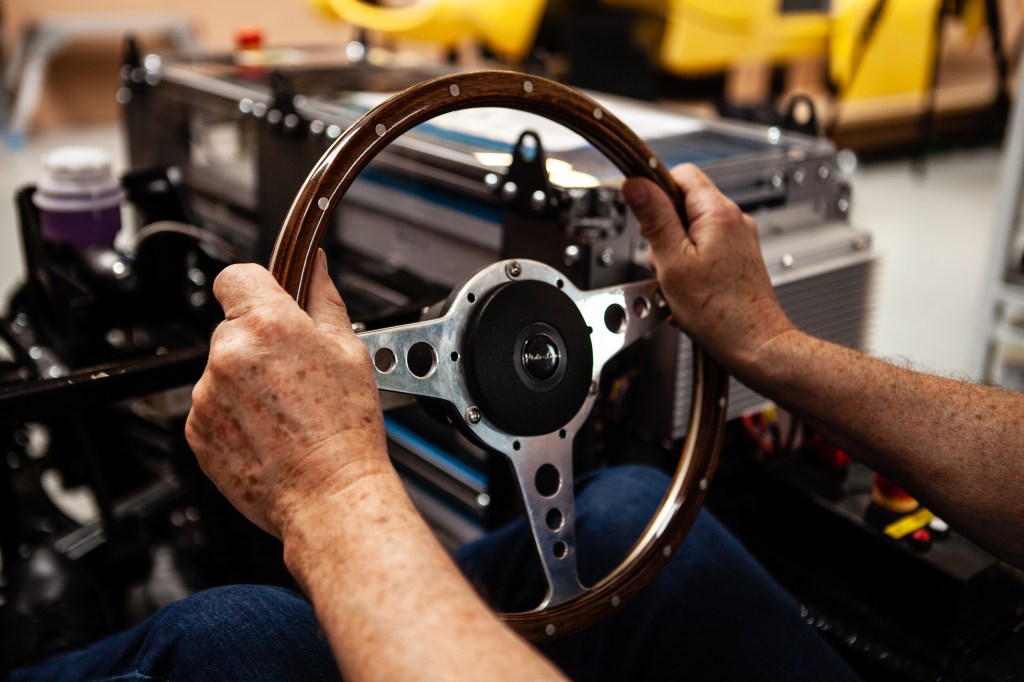Engineer behind legendary Metro 6R4 to launch all-new electric sports car with 'Frogeye' Sprite bodyshell (exclusive)
A leap in performance over the original
There are classic cars, continuation cars, restomods and electric conversions of historic vehicles, but the man behind the legendary MG Metro 6R4 is close to completing the first prototype of an altogether different prospect: an entirely new electric sports car but with the bodyshell of a beloved classic.
Paying homage to the ultra-charismatic Austin Healey ‘Frogeye’ Sprite of the 1950s, the Piper Sprite’s exterior is clearly that of the Gerry Coker-penned British sports car. But beneath the classic curves is a new race-tuned chassis and suspension set-up married to a very modern pure-electric powertrain.



The Piper Sprite is the brainchild of John Piper – the engineer behind the monstrous Metro 6R4 Group B rally car, Jaguar XJR-14 sports-prototype that he co-designed with F1 legend Ross Brawn, and the JCB Dieselmax land speed record-breaker.
While others are converting revered classics to battery propulsion, Piper Electric Vehicles (PEV) started with a blank piece of paper and designed the mechanicals from the ground up. And for good reason, Piper argues.
“As any classic car enthusiast will tell you, owning a British sportscar from the fifties and sixties is full of hardship and compromises,” he told Driving.co.uk. “Old cars are compromised in terms of design, chassis dynamics, comfort, ergonomics, materials and weight. They are also prone to decay and fatigue.
“New technologies allow us to create a significantly safer, better performing and more environmentally-friendly alternative.
“By combining the latest engineering under a classic bodyshell we achieve the very best of both worlds: a dynamically modern car with classic heritage and lovable appeal.”
The Piper Sprite, he said, is not specifically aimed at classic car enthusiasts looking for a beautifully restored original car; it’s designed for a new generation of owners seeking a cool, fun car with plenty of personality coupled with a great driving experience.
Being electric, it is also future proof — and likely to get approving nods from the environmentally-conscious.

Ensuring the 21st century Sprite looks the part and that the manufacturing process is as streamlined as possible, PEV has acquired moulds, tooling and drawings originated by the Frogeye Car Company that was established on the Isle of Wight in the mid-1980s.
It produced an updated version of the Mk1 Sprite that was good enough for Geoff Healey, son of Austin-Healey founder Donald, to approve the firm’s use of the Healey name.
The initial prototype of the Piper Sprite — the first vehicle to bear the designer’s own name — is nearing completion behind closed doors on an industrial unit somewhere in Bristol.
To ensure competition car levels of road-holding and agility, the lightweight glass-fibre body covers a strong and stiff steel monocoque chassis with McPherson strut independent front suspension and sophisticated twin wishbone independent rear suspension.
The stopping power expected of modern vehicles comes courtesy of disc brakes fitted in each corner.



The updates result in a huge step forward in terms of the chassis dynamics compared with an original Sprite, PEV says.
Power comes from a 350V electrical system delivering around 100bhp. With a sub-800kg kerb weight and the instant torque available from electric motors, the Piper Sprite should feel “spritely”, especially at low speeds.
It has a claimed 0-60mph acceleration time of less than eight seconds and a more than acceptable top speed of 100mph.
That’s a leap in performance compared the original roadster, too, which was fitted with a 948cc, 43bhp A-Series engine that could take it to 60mph in more than 20 seconds and would struggle to best 85mph at flat chat.

The Piper Sprite offers “the kind of performance that’s best suited for the modern world,” Piper told us.
The battery has a capacity of 36kWh, which is good enough for a range of 120 miles or so between charges, according to the manufacturer, with a recharging time of around four hours.
The initial plan is for right-hand-drive models built for the UK market. However, there are no technical reasons why left-hand-drive models cannot be engineered should overseas demand exist, Piper said.
“It will be a fun car that you will want to own,” said Piper. “Some cars have a rich history, some have outstanding design, some have unique character and some have a joyful personality. Very few – aside from the iconic Austin Healey ‘Frogeye’ Sprite – possess all of those attributes, most of which are sadly missing in so many modern cars.
“The immortal Frogeye is the essence of great design in that it never fails to put smiles on faces. Capturing that true-spirit, the Piper Sprite will have instant appeal and masses of street credibility.”

The price is yet to be confirmed but PEV says it will only be producing 200 units of the car, helping ensure it remains a rare site on roads in the UK and beyond. What’s more, each will be unique — hand-built to the customer’s exacting specifications.
“Every Piper Sprite will be finished to each individual purchaser’s own distinct tastes allowing them to put their own mark on their very personalised car,” said Piper.
“Owners will be offered wide choices of colours, fabrics, trim details, luggage, wheels, hoods and a range of other options, allowing them the excitement of stylising their very own tailor-made Piper Sprite.”
Pre-orders and chassis numbers will available to reserve when the project is officially confirmed in the next few weeks, once the first prototype is completed, Piper told us. The first cars should then be delivered to customers in spring 2023.
Related articles
- If you were interested in the Piper Sprite, you might like to read this story about the booming electric classic car conversion industry
- Did you know there’s now an off-the-shelf EV conversion it for the Land Rover Defender?
- Check out all the modern car makers’ electric vehicle plans here
Latest articles
- F1 2025 calendar and race reports: The new Formula One season as it happens
- Seven great automotive events to visit this summer, from F1 to art and champagne
- Watch new Porsche 911 GT3 smash Nürburgring record for manual cars
- Skoda Elroq 2025 review: Czech carmaker can’t seem to miss with its electric family cars
- Five best electric cars to buy in 2025
- Should I buy a diesel car in 2025?
- Zeekr 7X AWD 2025 review: A fast, spacious and high tech premium SUV — but someone call the chassis chief
- Denza Z9GT 2025 review: Flawed but sleek 1,062bhp shooting brake from BYD’s luxury arm
- Extended test: 2024 Renault Scenic E-Tech review













